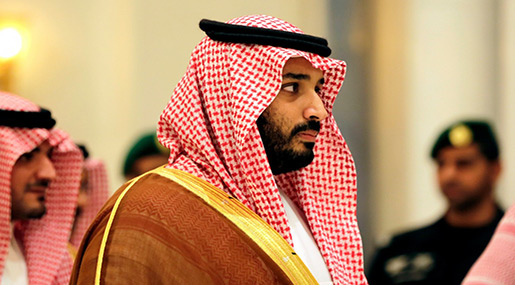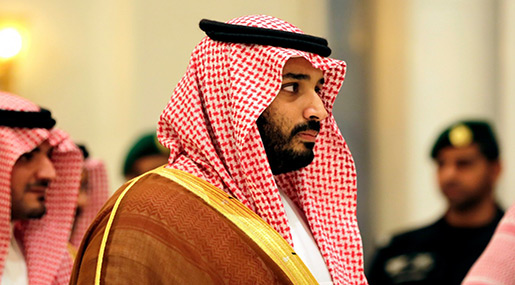
Salman Ignites the Dispute Over the Throne: The Coup Is Approaching!

Khalil Kawtharani
A series of orders and decisions issued by Saudi King Salman, the day before yesterday, numbered over 40, leading to a great deal of controversy among analysts. While the official media in the kingdom tried to distract the Saudi street from focusing on a decree that restored the allowances and bonuses for the employees [civil servants and military staff] which were cut following the oil price crisis, observers turned towards the new appointments and their implications in terms of the struggle within the ruling family.

Saudi Deputy Crown Prince Mohammed bin Salman has taken the biggest step in the process of curbing the powers of Crown Prince Mohammed bin Nayef, in a new attempt to cut the latter's path towards the throne, which both know passes through the US capital, Washington.
Bin Salman seems determined to remove any obstacle in his path, while Nayef remains silent about the decisions. Until yesterday evening, the man did not react to the new orders - he who had been entrusted with commenting on sensitive decisions in the Kingdom. He had previously described Bin Salman during the launch of the so-called "Vision 2030" as "my brother and my right hand" in an attempt to diminish the role of Bin Salman and to show him as a collaborator, not more.
The royal orders passed by Bin Salman, using his father's seal - according to those who know about the affairs of the Kingdom's governing body- included the decision to appoint the King's son Khalid bin Salman as the Saudi ambassador to the United States. The decision is a blatant desire on the part of Bin Salman to improve promoting his name in American circles as a successor to his father, after US reports denied that the decision-making circles in Washington have decided to select one of the two Mohammads. However, some of these reports have confirmed the tendency of the Americans to choose Mohammed bin Nayef, given his vast experience and the experience of the Americans in dealing with him, particularly in relation to the "war on terror" dossier.
And perhaps the last meeting with US President Donald Trump gave Bin Salman more enthusiasm to exploit his closeness to the Americans. The young prince, during the visit, sensed the willingness of Trump to hear Bin Salman and work with him on the major dossiers in the region. This is how Bin Salman found the opportunity to establish a secure hotline with the Americans that can be trusted to keep direct contact with Washington and the possibility of bypassing Nayef and keeping him out of the path of his ambitions.
Mohammed bin Salman's brother, Khalid bin Salman [born 1985], was chosen to replace Abdullah bin Faisal al-Saud as Riyadh's ambassador to Washington despite his young age and lack of political or diplomatic experience, making him the youngest Saudi to be appointed to such a position. Khalid is a lieutenant in the Saudi air force, who participated in the war in Yemen and the "International Coalition's" war against "Daesh". He graduated in 2009 from the United States Army Flight Program in Mississippi, after joining the King Faisal Air Academy in Riyadh.
Mohammed bin Salman was not content with all of the above. The jump on his cousin Mohammed bin Nayef yesterday appeared to be a full-scale war. He meddled in the intelligence, oil and internal security dossiers - the last in Bin Naif's possession.
Bin Salman undermined the authorities under Nayef's control including the Ministry of the Interior and the recently established Council on Political and Security Affairs, forming a rival center called "national security", directly linked to the Royal Court. Mohamed Ghafili was appointed as the "senior national security adviser", in a move likely to surround Bin Nayef and reduce his powers and influence in the Kingdom.
In a move no less serious, Bin Salman decided to promote the closest and most loyal man to him, the spokesman for the aggression coalition on Yemen, Ahmed Asiri. He was appointed to serve as deputy intelligence chief - in the most sensitive apparatus to ensure loyalties- replacing General Youssef al Idrissi. Mohammad bin Salman went even further in teasing Mohammed bin Nayef by appointing his nephew, the grandson of King Salman and the former advisor to the Saudi Embassy in London, Ahmed bin Fahd bin Salman, as the deputy of the governor of the Eastern Province Saud bin Nayef bin Abdul Aziz, the eldest brother of Mohammed bin Nayef.
In the oil dossier, King Salman's wing completed the acquisition of decision-making facilities in the petroleum wealth sector by creating a ministry on behalf of the "Energy Affairs" and appointing another son of the king as its minister, Prince Abdul Aziz bin Salman. Abdul Aziz is different from his brother Khaled as he has extensive experience and expertise in the oil sector. With the invention of this ministry for Abdul Aziz, the scene of assembling authorities and positions is complete and the decision-makers in the government is in hands of the small Salman bin Abdul Aziz family.
The decisions revealed a tendency among Salman's wing to select people for positions based on two decisive factors; they must have kinship to the current king or be his descendants. This is contrary to the custom of attempting to please the majority of the children of the kingdom's founder Abdul Aziz. The Salman wing as it takes positions appears to be unaffected by moving the stagnant water of the other wings of the children of Abdul Aziz and his grandsons, as it insists on spreading despair among the others who are waiting for any chance in inheriting from Abdul Aziz.
The new chapter of Bin Salman's white coup against Bin Nayef was camouflaged by the former with a "smoke bomb" that included a number of populist decisions that call for media celebrations, most notably the decree to restore the allowances, bonuses and financial benefits to state employees to what it was before the decision to cancel them months ago as well as a decision to end the tests before the month of Ramadan, and the disbursement of two salaries for the military "actively" participating in the aggression on Yemen.
The decisions were preceded by a Mohammed bin Salman interview conducted by American author David Ignatius for the Washington Post, which acted as a warning from Bin Salman directed to Bin Naif, and renewed his image of the man who is solely governing. The last royal orders that followed the interview abolished what Ignatius wrote about "the political tension hypothesis [between Bin Nayef and Bin Salman] not being on the table."
The most innovative decision comes in the form of the Saudi king's order to replace the Minister of Civil Service, Khalid Al-Arj, and to place him under investigation over a report submitted by the head of the "National Anti-Corruption Authority". The charges against him allege that Al-Arj appointed one of his sons, Abdullah A l-Arj, to one of the state jobs.
Source: Al-Akhbar, Translated and Edited by website team



